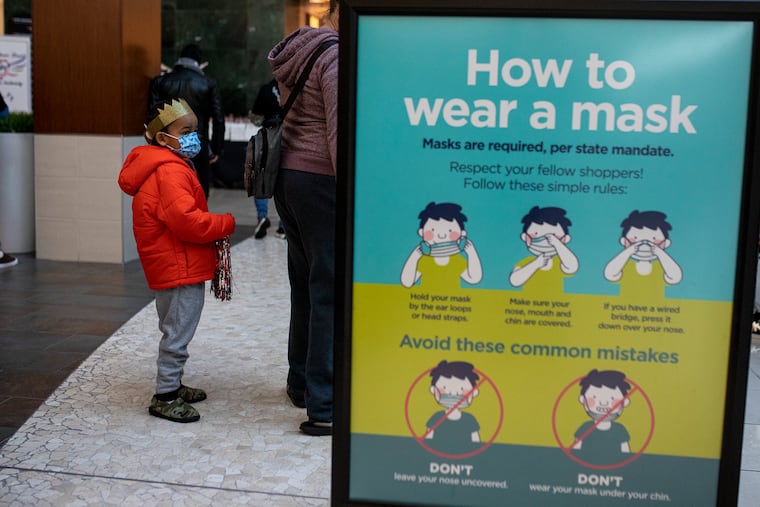Navigating mask-wearing for kids and parents under the new CDC guidelines
Why the CDC updated its mask policy and what you need to know about the change.

The U.S. Centers for Disease Control and Prevention on Thursday said people who are fully vaccinated against COVID-19 do not need to wear masks indoors or outdoors. Pennsylvania health officials updated their guidance to align with the CDC’s, while officials in Philadelphia said they were reviewing the new advice. New Jersey announced Friday they will continue to mandate masks indoors even for fully vaccinated people.
Here’s what you need to know:
Why is the CDC changing its masking policy?
Several recent studies have shown that the vaccines developed by Pfizer, Moderna, and Johnson & Johnson are highly effective in preventing infection and severe illness from COVID-19 and common variants of the virus. The risk of getting infected without a mask if you have been vaccinated is very low, less than 10% if exposed.
What does ‘fully vaccinated’ mean?
People are fully vaccinated two weeks after their second dose of a two-shot vaccine (Pfizer or Moderna), or two weeks after a single-dose vaccine (Johnson & Johnson).
Is there anyone who should still wear a mask even though vaccinated?
Individuals with a weak immune system, such as those who have had cancer or an organ transplant, should speak to their doctor before going without a mask because the vaccines might not be as effective for them. People should still wear a mask in certain crowded indoor settings, including buses, planes, and hospitals.
Do children need to wear masks?
Children ages 2 to 12 should wear a mask in public because they are not yet eligible to be vaccinated. Children over age 12 who are fully vaccinated do not need to wear a mask.
Pfizer’s two-dose vaccine is currently available for people 12 years and older. People 18 and older can get Moderna’s two-dose vaccine or the single-dose Johnson & Johnson vaccine.
I’m fully vaccinated but I have a child under age 12. Should I still wear a mask?
The CDC’s guidance did not specifically address parents of children under age 12, who are not currently eligible for the vaccine, but studies have found that the risk of someone who is fully vaccinated transmitting the virus is remote. It is highly unlikely that a vaccinated adult will pass on the virus to an unvaccinated child, which means fully vaccinated parents and guardians of young children do not need to wear a mask.
However, adults may choose to continue wearing a mask in public to set an example for children who do still need to wear one (and may be especially reluctant to do so if their parents aren’t also masking).
Alternatively, parents who decide to abandon their masks can use the decision as an opportunity to discuss science and vaccines with their children.
How do I talk to my child about the new mask guidance?
Many children hate wearing a mask, so convincing them they must continue to wear one — even though their parents aren’t — may be challenging.
Daniel Taylor, an associate professor of pediatrics for Drexel University College of Medicine and a pediatrician at St. Christopher’s Hospital for Children, suggested bringing the issue to their world by applying the rules to an activity they enjoy. Focus on what they can do, as more people get vaccinated, rather than what they can’t do (take off their own mask).
For instance: As more adults get vaccinated, it’s becoming safer to do things like go to the zoo. But in order to do that, unvaccinated children need to wear a mask to be safe.
A little optimism and sympathy may go a long way: Explain to children that scientists are making vaccines to protect children from the coronavirus, but they’re not quite ready. Having to wear a mask isn’t fun, but it won’t be for much longer and means that, in the meantime, we can do some of the fun activities we’ve missed out on over the past year.
When will COVID-19 vaccines be available for children under age 12?
Pfizer and Moderna both have trials in progress to evaluate the vaccine’s efficacy among children as young as 6 months old. Children’s Hospital of Philadelphia is part of Moderna’s trial in children.
Pfizer said during a recent quarterly earnings call that it expects to apply for authorization among children ages 2 to 11 in September.
How soon the vaccine can be made available to younger children will depend on the outcomes of these studies.